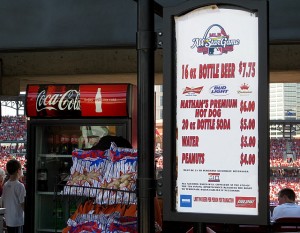Ballpark food lighting up our Pleistocene taste buds.
What is it about ballpark food that makes it so delicious? I think that these new truth-in-marketing signs at the ballpark pretty well sum it up.
 These stadium food vendors truly excel in offering superstimuli for our not-ready-for-modern-times stomachs and eyes. What should we do about this mismatch between our pleistocene cravings and our modern abilities to pump out this life-shortening quality-of-life-diminishing fare? That's the question raised by Dr. David Kessler, former Commissioner of the FDA:
These stadium food vendors truly excel in offering superstimuli for our not-ready-for-modern-times stomachs and eyes. What should we do about this mismatch between our pleistocene cravings and our modern abilities to pump out this life-shortening quality-of-life-diminishing fare? That's the question raised by Dr. David Kessler, former Commissioner of the FDA:
Fifty years ago, the tobacco industry, confronted with the evidence that smoking causes cancer, decided to deny the science and deceive the American public. Now, we know that highly palatable foods—sugar, fat, salt—are highly reinforcing and can activate the reward center of the brain. For many people, that activation is sustained when they're cued. They have such a hard time controlling their eating because they're constantly being bombarded—their brain is constantly being activated.
For decades the food industry was able to argue, "We're just giving consumers what they want." Now we know that giving them highly salient stimuli is activating their brains. The question becomes what do they do now?
When I say "superstimulus, I mean it. I can't believe how many obese people I recently saw at the stadium. Half of them wore Albert Pujols jerseys, but none of them looked like Albert Pujols. Now, while we're still discussing stadium food, here's an untouched photo clearly demonstrating that the world is almost out of fresh water. After all, there's no other explanation for why anyone would pay twice as much for 20 ounces of drinking water than for a gallon of refined gasoline. I can just imagine the conversation:
Child: Daddy, can I have a few sips of water?
Father: Billy, how many times have I told you that we can't afford to drink water!
I can just imagine the conversation:
Child: Daddy, can I have a few sips of water?
Father: Billy, how many times have I told you that we can't afford to drink water!

